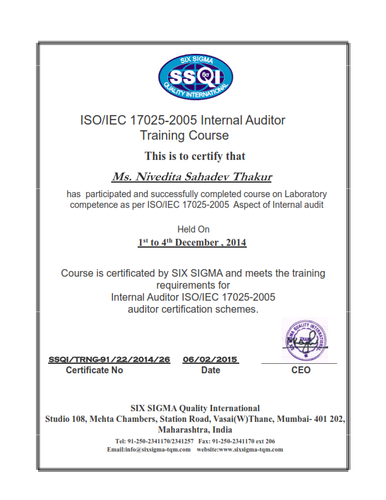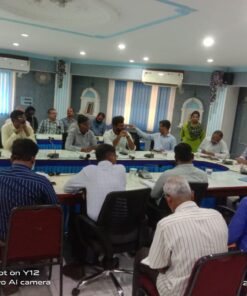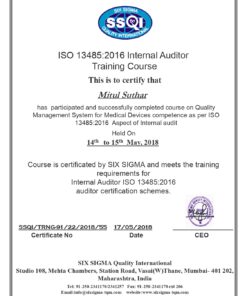Sale!
Internal Auditor Training
Original price was: ₹10,000.00.₹8,500.00Current price is: ₹8,500.00.
Internal auditor training is essential for individuals responsible for evaluating and improving the effectiveness of an organization’s internal controls, risk management, and governance processes. This training ensures that auditors have the necessary skills, knowledge, and competencies to carry out their roles effectively.
Here’s an outline of what internal auditor training might cover:
1. **Introduction to Internal Auditing**
– Definition and objectives of internal auditing
– Role and responsibilities of internal auditors
– Differences between internal and external auditing
2. **Internal Audit Standards and Frameworks**
– Overview of international standards such as the International Professional Practices Framework (IPPF)
– Compliance with local regulatory requirements
– Importance of ethical principles in auditing
3. **Risk Management and Control**
– Understanding organizational risk management frameworks
– Identifying and assessing risks
– Evaluating the design and effectiveness of internal controls
4. **Audit Methodologies and Techniques**
– Planning and scoping audits
– Conducting fieldwork and gathering evidence
– Analyzing and interpreting findings
– Reporting and communicating audit results
5. **Audit Tools and Technology**
– Using audit software and data analytics tools
– Leveraging technology in audit processes
– Data extraction and analysis techniques
6. **Communication and Reporting**
– Effective communication skills for auditors
– Writing clear and concise audit reports
– Presenting findings to management and stakeholders
7. **Professional Development and Ethics**
– Continuing professional education requirements
– Ethical considerations and principles for auditors
– Upholding independence and objectivity
8. **Practical Exercises and Case Studies**
– Hands-on exercises to apply auditing concepts
– Analyzing real-world audit scenarios and case studies
– Group discussions and problem-solving activities
9. **Quality Assurance and Improvement**
– Internal audit quality assurance frameworks
– Continuous improvement of audit processes
– Feedback and evaluation mechanisms
10. **Soft Skills Development**
– Time management and organizational skills
– Critical thinking and analytical skills
– Teamwork and collaboration
It’s beneficial for internal auditors to participate in formal training programs offered by professional organizations like The Institute of Internal Auditors (IIA) or other reputable training providers. These organizations often offer certifications like the Certified Internal Auditor (CIA) designation, which can enhance an auditor’s credibility and career prospects.
In addition to formal training, internal auditors should also engage in ongoing professional development activities, such as attending seminars, workshops, and conferences, to stay updated with the latest industry trends, regulations, and best practices. Continuous learning and improvement are key to becoming a successful and effective internal auditor.









Reviews
There are no reviews yet.